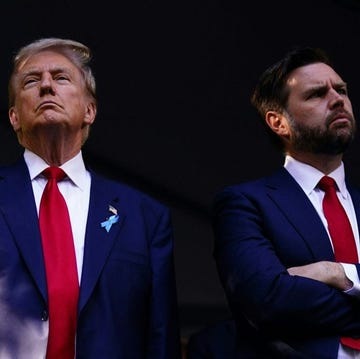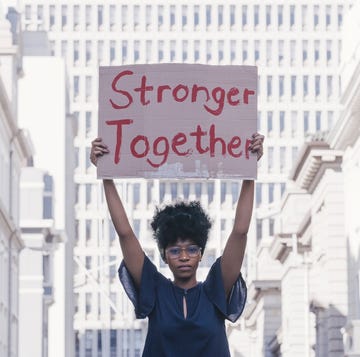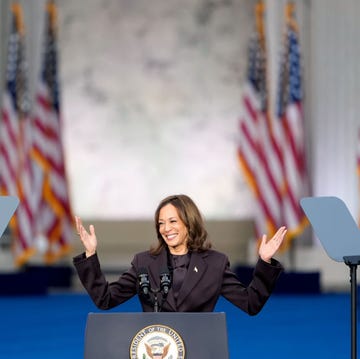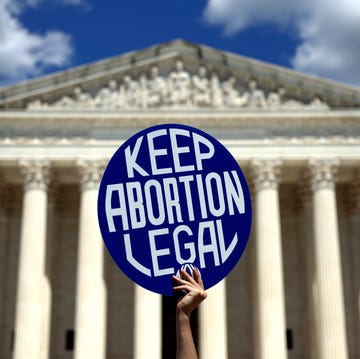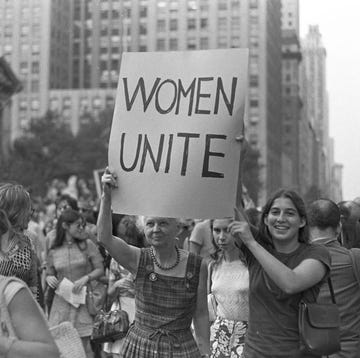Gun control has long been a heated topic of debate between Democrats and Republicans, with conservatives often assuming liberals want to take away their guns, and liberals pushing for stricter gun laws in hopes of saving innocent lives. It’s an issue that has divided the parties for decades, which is why Kamala Harris’s recent pro-gun comments went viral as soon as she uttered them.
At Harris’s presidential debate in September against Donald Trump, the former president claimed his opponent would “confiscate everybody’s gun” if elected, to which Harris replied: “We’re not taking anyone’s guns away, so stop with the continuous lying about this stuff.” She added that both she and her running mate, Tim Walz, are responsible gun owners.
Then, days later, in a livestreamed Harris campaign event hosted by Oprah Winfrey, the Democratic nominee said that she has no intention of taking away people’s guns if elected. Harris added that in fact, she likes her gun, and would be more than willing to use it necessary. “If somebody breaks into my house, they’re getting shot,” she said before catching herself and noting, “I probably should not have said that. But my staff will deal with that later.”
Still, it’s important to note that while Harris is in favor of guns for self-defense, she is very much also in favor of enforcing laws around firearm control, especially amid the United States’ school shooting epidemic.
Ahead, we break down each candidate’s views on gun control.
Kamala Harris
What Harris wants people to understand is that the fact that she is a gun owner does not mean she supports reckless gun use or irresponsible gun ownership.
“I think for far too long on the issue of gun violence, some people have been pushing a really false choice to suggest you’re either in favor of the Second Amendment or you want to take everyone’s guns away,” Harris told Winfrey at her campaign event. “I’m in favor of the Second Amendment and I’m in favor of assault weapons bans, universal background checks [and] red flag laws. And these are just common sense.”
As a former attorney general—the top law enforcement job in the state—in California, Harris acquired a gun some years ago for self-protection, but putting a stop to gun violence remains a central part of her campaign as she runs for president.
In 2023, amid a rise in deadly school shootings, President Joe Biden established the White House Office of Gun Violence Prevention, which Harris oversees as his VP. She also supported Biden’s Bipartisan Safer Communities Act, which he signed into law in 2022, and which made history as the first major federal gun legislation to be passed since the Federal Assault Weapons Ban of 1994.
The act pushes stricter background checks, creates new criminal penalties for gun trafficking, sets new rules for gun dealers to be licensed, and makes it more dangerous and difficult for someone to purchase a gun on behalf of someone banned from doing so.
“Every year, thousands of unlicensed gun dealers sell tens of thousands of guns without a background check, including to buyers who would have failed one—domestic abusers, violent felons, and even children. This single gap in our federal background check system has caused unimaginable pain and suffering. Today, as the head of the White House Office of Gun Violence Prevention, I am proud to say that all gun dealers must conduct background checks no matter where or how they sell,” Harris said in a statement at the time.
The Biden-Harris administration also invested $1.4 billion in violence-prevention and intervention programs.
“In the United States of America today, the number one killer of our children is gun violence…and when we take the time to consider what this means, let us understand how many people in our country, including our children, are experiencing profound trauma that manifests itself in so many ways,” Harris said while announcing her and Biden’s latest push for gun control earlier this year. “We are here today to talk about many things including the need for reasonable gun safety laws, but also the trauma and what we must do to assist in the diagnosis and treatment of it. For all of those reasons, I am proud to be here to share that we are announcing $285 million as part of our administration’s initiative to hire and train mental health counselors in schools.”
In summary, Kamala Harris:
- Owns a gun; is not anti-guns.
- Will not take away responsible gun owners’ guns.
- Supports banning assault weapons.
- Will continue to push for strict background checks and gun ownership laws.
- Will continue to establish violence-prevention and mental health programs and services in and outside schools to end school shootings and massacres.
Donald Trump
The former president has stood by his false claim that gun control laws do not work.
During a press conference this summer, he tried to make his point by noting that Chicago had a particularly deadly Fourth of July weekend—with 74 shootings, including three mass shooting—despite Illinois’s strong gun control laws. He failed to mention that the state is surrounded by other states with much weaker restrictions on guns, and that people can easily cross those borders to purchase weapons.
Trump has long aligned with the pro-gun conservatives who make up a large part of his following, and has promised to have a hands-off approach to gun restrictions if elected. “Every single Biden attack on gun owners and manufacturers will be terminated on my very first week back in office, perhaps my first day,” Trump said at the National Rifle Association and Presidential Forum in Harrisburg, Pennsylvania, earlier this year.
He added that he specifically would eradicate the Biden administration’s “zero-tolerance” policy, which revokes federal licenses from firearm dealers who have violated gun laws. And, Trump said he would undo Biden’s regulations on pistol braces, the stabilization devices that have been used by shooters to successfully kill thousands of innocent people across the country. (Attorneys general in several Republican states have filed lawsuits over Biden’s ban, claiming that millions of gun owners use braces to make shooting more accurate, “and therefore safer.”)
To the dismay of the NRA, during his presidency, Trump did encourage states to pass red flag laws (which allow state courts to temporarily seize firearms from a person—or prohibit a person from purchasing firearms—if they believe said person could be dangerous), and he banned bump stocks, a type of attachment that essentially makes semiautomatic weapons into war-ready machine guns. But besides those exceptions, Trump’s time in the White House resulted in loosened gun restrictions, and during the COVID-19 pandemic, he even declared gun stores, shooting ranges, and weapons manufacturers “essential services.”
Trump’s running mate, Senator JD Vance of Ohio, has said the solution to stopping school massacres is not to keep dangerous people away from guns, but to put heavier doors with better locks on classrooms. Trump and many Republicans agree. “President Trump will support school districts that allow highly trained teachers to carry concealed weapons at school,” his campaign states in an Agenda 47 item titled “President Trump’s Ten Principles For Great Schools Leading to Great Jobs.” He also suggests using federal funding to hire “veterans, retired police officers, and other trained gun owners as armed guards in our nation’s schools.”
John Feinblatt, president of Everytown for Gun Safety, said in a statement this February: “With Trump recently telling Americans to ‘get over’ school shootings, we know what a second term would be like: The NRA would once again treat the White House like its clubhouse, and the bipartisan, life-saving progress we’ve made on gun safety will be in grave danger.”
In summary, Donald Trump:
- Does not believe gun control laws work.
- Doesn’t think restricting people’s access to firearms will decrease crime or mass shootings.
- Accepted an endorsement by the National Rifle Association.
- Does not want to ban assault weapons.
- Does not believe mass shootings can be stopped by restricting gun access.
- Does not feel the need to strengthen background check procedures for potential gun buyers or gun dealers.





